Miss Peregrine’s Home for Peculiar Children Author Ransom Riggs on Why You Need to Print Your Instagrams Out
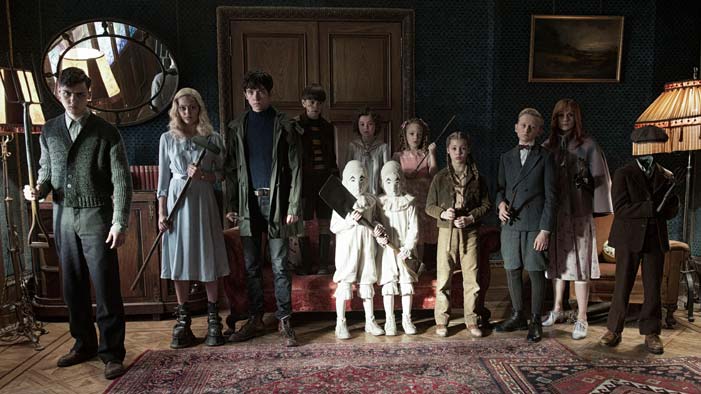 Miss Peregrine’s Home for Peculiar Children is something of a school for the gifted and talented, if your particular aptitude is, say, creating fire out of thin air, being invisible, or having a stomach full of bees (same). Like the Xavier Institute, the students at Miss Peregrine’s are not safe at large in the world—they’re considered freaks by non-peculiars, and targeted for annihilation by the shadowy world of the Hollowgast. The titular Miss Peregrine, played by Eva Green, keeps them all safe in a time-travel “loop”—on the island of Cairnholm, Wales, it is September 3, 1940, all day, every day. This is the secret world a Floridian teen, Jake (Asa Butterfield), stumbles upon after his grandfather dies under curious circumstances,* leaving him a series of clues.
Miss Peregrine’s Home for Peculiar Children is something of a school for the gifted and talented, if your particular aptitude is, say, creating fire out of thin air, being invisible, or having a stomach full of bees (same). Like the Xavier Institute, the students at Miss Peregrine’s are not safe at large in the world—they’re considered freaks by non-peculiars, and targeted for annihilation by the shadowy world of the Hollowgast. The titular Miss Peregrine, played by Eva Green, keeps them all safe in a time-travel “loop”—on the island of Cairnholm, Wales, it is September 3, 1940, all day, every day. This is the secret world a Floridian teen, Jake (Asa Butterfield), stumbles upon after his grandfather dies under curious circumstances,* leaving him a series of clues.
*Straight up, a terrifying monster that steals his eyeballs, and looks part-Slenderman, part-Zoidberg.
Written by Ransom Riggs, the story now spans three books (plus a fourth companion tome) and hits cinemas this Friday as a freaky, sweet, thrilling Tim Burton film (the eyeliner checks out). We were lucky enough to chat to Ransom about the movie, monsters, kickass grandparents, and why you should print your Instagrams out NOW.
SparkLife: I was struck by the strong bond that Jake has is with his grandfather, Abe. His dad is kind of “absent”—
Ransom Riggs: He means well. He’s just not so great.
SL: Ha, I was like, “Good thing you cast Chris O’Dowd!” But there are quite a few classic books that explore the grandparent-grandchild relationship—Charlie and the Chocolate Factory, Heidi—and I’m wondering what it means to you, why it’s different, or why it’s special?
RR: Well, I was very close to my grandmother. She was a devourer of books, a brilliant woman who graduated from the University of Chicago in the 1930s when they didn’t have a lot of women there, and she was a teacher of English and Latin, and also a farmer—she was a farmer’s wife, and ran a farm in addition to teaching, and doing all this crazy stuff. She was a hugely ambitious woman and a big influence on me, and taught me to love books, and to be ambitious.
And I didn’t have a father. He passed away when I was pretty young, so I had this pretty strong bond with my grandmother. So I think there’s probably something there, although that did not, weirdly, occur to me while I was writing the book, only afterward.
So you originally collected the vintage pictures and the story built out of there, but you wound up setting it in Wales. And I think a lot of stories, or a lot of magical stories, find their way into the Old World. It’s easy for us to imagine magic in the past, or in Europe, or Britain. I’m wondering if you think it’s hard to imagine magic in America? There are jokes in the film about, “It’s Florida. Nothing magical can happen here.”
Well, I grew up in a small suburban town on beach, in Florida, feeling like I lived in a very un-magical place, and wishing that I could find a door to another world. So in some ways it’s autobiographical, and I really liked the contrast between what seems like a very mundane world, and the foggy world of this island full of strange people on the other side of the world. It really felt like a contrast that I could mine, and mirror the dreams I had as a teenager myself. So it wasn’t necessarily like, “Magic is impossible in America,” it just felt like I needed to go far away from where the character lived.
And I know there are loops everywhere. I think I saw one in—
There might be loops in Florida [chuckles]. We’ll find out.
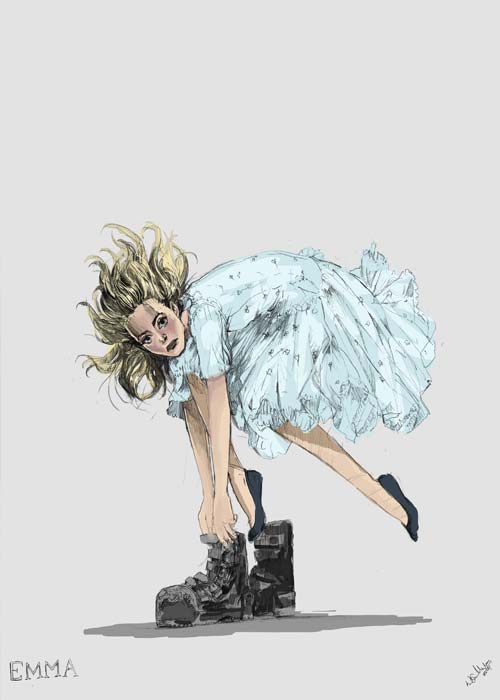
Costume sketch by Colleen Atwood, costume designer of Miss Peregrine’s Home for Peculiar Children
There could be! We’ve seen the idea of the peculiars or the freaks in things like X-Men. So there are obvious analogues, but I’m wondering if you were influenced by anything a little less well-known—Geek Love comes to mind—a kind of different look at what your Otherness means.
Just I think my own experiences, feeling different and strange. Loving outsider art and strange fiction and fantasy and sci-fi, and I don’t know. I wouldn’t say that the story came from photos, but my love of old photos influenced the development of the story a bit and they were useful as tools in telling the story. And there are so many outsiders and strangenesses to be found in artifacts from another time. I feel like if we were just to go 100 years ago in the place you live now, it would be more alien than going to strangest place on Earth in the present. The past is such a rich trove of mystery to me.
What are people going to think when they dig up our Instagram accounts?
I’m pretty sure a solar flare will wipe all of our hard drives pretty soon and they will find nothing. We will be the blank generation and that makes me sad. So print out your photos, kids!
Photos yes. Facebook history, no.
No. Which is probably for most people a good thing. That tweet you sent will not be remembered.
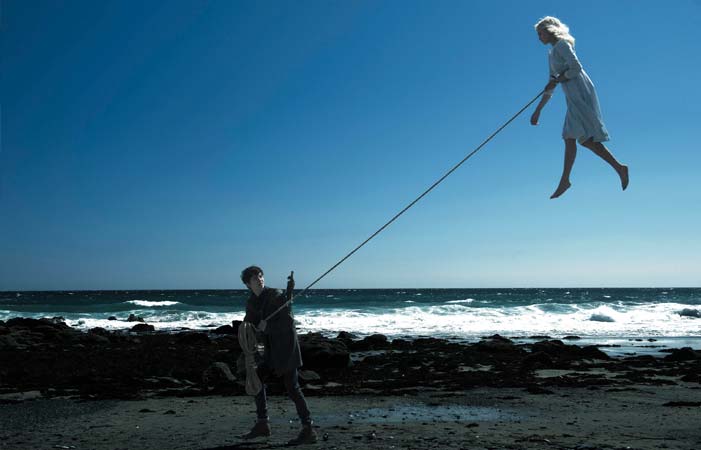
When you are so hungry you worry you are going to float away. 20th Century Fox
That’s right. Phew. I loved the way time travel is contemplated, especially for Abe and for Jake as relates to Emma. And I thought that it got to the idea of how in friendships or relationships, one party can grow at a different speed than the other.
I think it often feels in relationships between men and women, the women are more advanced and mature than the men. It takes Abe 80 years to recognize what he had and gave away for whatever reason, you know?
There is something sort of sophisticated there though about the way the kids know that they’re the same age, or living the same day, but they’re—
They are 100 years old, even though they appear to be children, so they are a bit more than their visual age suggests. And yet, they’re arrested—like, the most literal example of arrested development you can think of is their reality.
I mean, if you were their parent, maybe I can see—
Getting that little cracked smiled that Miss Peregrine gets every once in a while.
Haha yes.
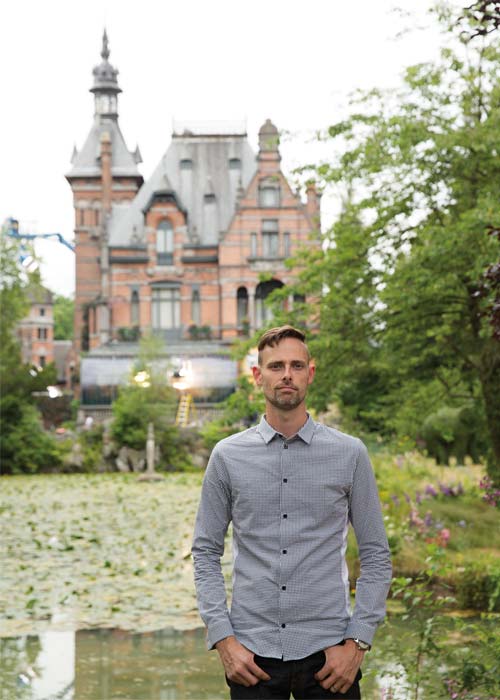
Ransom Riggs, probable peculiar, in front of Miss Peregrine’s “home.” 20th Century Fox
So in the movie, there are some changes, some tweaks to the way it plays out, which was obviously very exciting to watch. It felt like the kids were more weaponized than we’d seen in the books.
There’s a lot more weaponization of the children in the later books because there’s a lot more danger. And actually for the sake of the movie I felt like it was necessary to rope in a little more of the continuation of the story, because the first novel ends in a little bit of a cliff-hanger—a really big cliff-hanger actually. And to make a satisfying and self-contained film, I really think they needed to have that third act of action and adventure, and sort of resolution. Not complete resolution, but like the immediate problem has been solved, the humans have been saved. To do that you kind of had to—it’s the Chekhov saying that saying when the gun is on the wall and then first act it’s going to go off by the third act.
That’s exactly what how we teach Chekhov at SparkNotes.
Right? So the kids all had these wonderful abilities and you, the first time you see them introduced, you wonder, “How do you put that to use?” Or, “They spend most of their time just boiling tea, but what else can they do?” I think it’s fun for the audience to see them play it out.
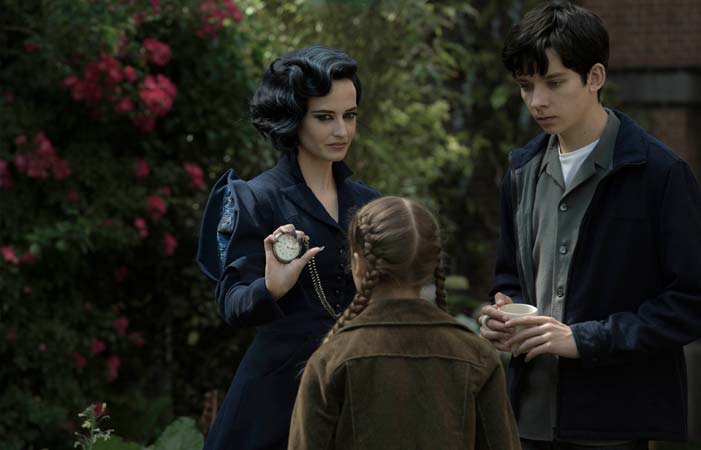
Miss Peregrine, Jake, and Fiona, bestlifing September 3, 1940. 20th Century Fox
Miss Peregrine is an interesting kind of role model for the kids. I’m wondering if you personally had a good teacher or a mentor that still sticks in your mind?
I was lucky to have many good teachers when I was growing up throughout my education. But my mom and my grandma were those people for me. My grandmother, Florence, was especially a big influence in my life. Growing up, she was a farmer, and a teacher, and devoured books, and was stern but loving and wouldn’t take no for an answer if you’re talking about being able to do things. She was always going to push you and that great mix of things, that range from maternal to authority, I guess.
Have we lost those skills now that we’re just digital shells? Do we need to go farming?
I think we need to go farming. And I feel there’s a backlash growing among people who are like, “Oh wait, I am too connected? I need to do something about it.” And hopefully there will be a self-correction.
brb, off to dye my hair blue/raise some chickens. (Thank you so much for speaking with us!)
Be honest: do you, or do you not, have a back-mouth? Is Ransom Riggs a bit of a legend?












